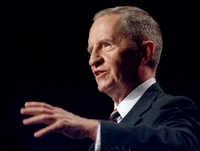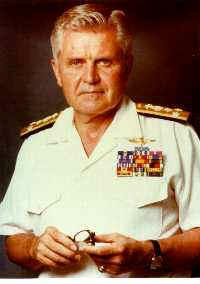Michael Fumento
Factual · Powerful · Original · Iconoclastic
Leaders & Success — H. Ross Perot
March 31, 1992 · Michael Fumento · Investor’s Business Daily · EconomyHis backers say he’s smart, gutsy and, most importantly, he’s not George Bush or Democratic presidential front-runner Bill Clinton.
In a year in which incumbency may be a liability, 61-year-old Texas billionaire H. Ross Perot, seriously contemplating a run for the presidency as an independent candidate, is seen by many as the knight in shining armor riding up on a white steed to rescue a nation endangered by high unemployment, low literacy and inept national leadership. They hope he would run the government as efficiently as he has run his own businesses.

H. Ross Perot
"He says what he means and means what he says," said Jack Gargon, head of the Tampa, Fla.-based group Throw the Hypocritical Rascals Out. "He owes no political favors to anyone. He see below understands what’s wrong with the nation and he has a plan to fix it."
But some warn that when the knight’s visor is raised, the anxious damsel might not like what she sees.
Considered one of the two dozen or so richest men in America, with a net worth of over $3 billion, Perot is certainly no stranger to success.
In 1962, with $ 1,000, he founded Electronic Data Systems Corp., which offered computer services to companies that could not afford their own computer systems. He sold the company to General Motors Corp. in 1984 for $ 2.5 billion plus a seat on GM’s board.
He so angered then-Chairman Roger Smith and other board members with his ideas of how to improve GM’s efficiency that the company bought back his stake for about $700 million in 1986.
No one can say Perot isn’t gutsy.
He is probably best known to the public for planning and organizing a commando raid in 1979 to rescue two of his employees from a Tehran jail during the Iranian hostage crisis, a feat that was turned into a novel and a television mini-series, On the Wings of Eagles.
A decade earlier he attempted, unsuccessfully, to ship two planeloads of food to American POWs held by Hanoi. Perot has also sponsored forays into Laos in failed efforts to bring out evidence of Americans missing in action during the Vietnam War.
Yesterday, Perot announced that his "interim" running mate will be Vice Admiral James B. Stockdale, a former Vietnam prisoner of war who was also the subject of a made-for-TV movie. Stockdale will serve on the ticket, said Perot, until a permanent selection is made later this year.
No one doubts that Perot has stirred visceral anti-establishment sentiment among a sector of the American public.
Calls Flooding In

Adm. James Stockdale
Since he told television interviewer Larry King in February that he would consider being drafted for the presidency, the phones at Perot Systems Corp., his new computer services company, have not stopped ringing. Last week they were handling 1,500 calls an hour.
As to his ability to win the presidency, one factor often cited is Perot’s billions.
Perot has vowed to spend $50 million or $100 million or "whatever it takes" to finance a campaign if he runs.
By contrast, President Bush spent $30 million in his post-primary election run in 1988 and his Democratic opponent Michael Dukakis spent $2 million less.
Perot’s funding would reverse one of the largest disadvantages third-party presidential challengers face: a lack of funds.
But, says Democratic political analyst Joe Cerrell of the Los Angeles-based consulting firm Cerrell & Associates, his biggest problem is that "he has to work at a rapid pace to get on the ballot in all the states."
Petition drives are believed to be under way in all the states, and Perot has indicated that he might provide financial support to the signature-collecting efforts.
Others say Perot’s biggest problem will be when he has to start staking out positions other than merely being against the establishment.
So far, Perot has made it clear what he’s against. In a recent speech to the National Press Club in Washington, D.C., Perot said that the city "has become a town filled with sound bites, shell games, handlers and media stuntmen who posture, create images and talk, shoot off Roman candles but don’t ever accomplish anything."
He told the Press Club that he would reduce the size of the federal government, greatly reduce White House, congressional and cabinet staffs, and work for a line-item veto.
He has also said he favors abortion rights, further restrictions on gun ownership, and major education reform.
One position Perot took that Texas Republican Party Chairman Fred Meyer thinks might hurt him in Texas and elsewhere was his vocal and well-publicized opposition to the Persian Gulf war until the shooting began.

Yet Perot’s patriotism is unchallenged. His graduation from the Naval Academy — where he was twice class president — and his service at sea may soften whatever ill feeling his opposition to the war might have engendered.
But Perot has not yet had the opportunity to stake out many specific positions or policies.
David Hill, a Republican political consultant in Houston, said, "I think he’s got a lot of ideas that will frighten people when they become known. He will not implement incremental change."
"My suspicion," he said, "is the better known some of his goofier ideas become," the less attractive a candidate he’ll be.
Republican consultant Neil Newhouse of Public Opinion Strategies in Alexandria, Va., is more blunt.
"This year, being a political outsider is an advantage, no doubt about it. At the same time I think his message is extremely naive," he said.
So far, said Newhouse, Perot has been "treated with kid gloves." But "once the press starts examining his issue positions," he said, "I don’t think he will have a thread of credibility to stand on. The press will rip the guy to shreds."
But, said Cerrell, "There are a lot of people out there [who are] not particularly enamored with President Bush or Bill Clinton who could very well find themselves voting for Mr. Perot."
"I have observed Ross Perot many years and . . . he’s a very bright, articulate billionaire. You don’t get to where he is in life without having something on the ball."
Perot is widely considered to be conservative because he is a businessman, but those on both the right and the left would dispute tagging him as such.
Howard Phillips, chairman of the Conservative Caucus in Vienna, Va., said Perot is "of course" not a conservative. In fact, he said, Perot is a populist "in the tradition of [President] Lyndon Johnson and [Texas Governor] John Connally."
Citing Perot’s positions on abortion, gun control and collecting more tax revenue from the public, Phillips says that, though he thinks very highly of Perot, "his political philosophy is very different from mine."
Jeff Faux, President of the Economic Policy Institute, a liberal Washington, D.C. think tank, says Perot does represent the thinking of many businessmen but can’t really be characterized as conservative.
"I think he represents a fair amount of sentiment in the American business community outside Wall Street and Washington," he said.
He added that Perot appeals to businessmen who think that a tax hike is needed to close the federal budget, that certain industries must be protected from foreign competition and that the recently negotiated trade agreement with Mexico will cost American jobs.
Impact On Rivals Unclear
If Perot doesn’t become the next president, he may still help determine who wins by draining off votes in such key states as Texas.
Some pundits have assumed that votes for Perot would necessarily come from Bush’s plate. "It’s got to have the White House shaking in their boots," Democratic Chairman Ronald H. Brown has said.
But Meyer is less certain. "Populists have historically been Democrat," he noted, and therefore Perot may appeal to Democratic voters.
"It’s a possibility that Perot as a southerner can siphon off votes from southerner Bill Clinton," he said.
